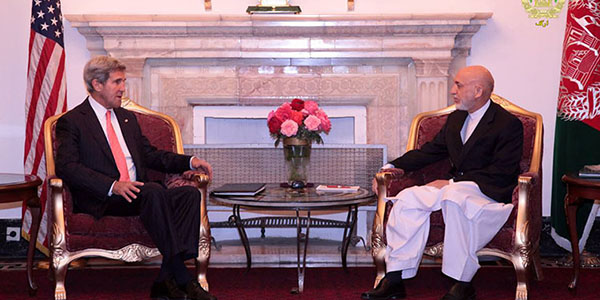Last week, US foreign Secretary of the State, John Kerry paid a sudden visit to Kabul to meet President Karzai and discuss over the Bilateral Security Agreement (BSA) which has remained buoyant on the untamed stream of bilateral relation. After a period of vapidity, President Karzai reenergized the negotiation process by authorizing Dr. Spanta, the National Security Advisor, Zalmai Rasoul, Foreign Minister, and Ashraf Ghani Ahmadzai, an academician and a well-known Afghan diplomat to advance it with Washington diplomats on August this year. Back then, there were signs that Mr. President Karzai had reached to agreement at the backstage, but soon vanished as President Karzai once again told that his government had no hurry to sign the agreement instead would prefer next government does.
The unexpected visit of John Kerry once again reflected how the US officials are trying to persuade Afghan officials to sign the agreement before the third presidential election. While President Karzai consistently has expressed that he has no hurry for the contract, putting it as an option for the next government. After discussion, both attended a press conference in Kabul saying that they agreed on variety of issues. Despite that both said that they had not yet decided about the destiny of American security forces after the completion of military withdrawal. While President Karzai emphasizes on the national sovereignty but Washington will not compromise on legal immunity for its forces as observed in the case of Iraq. When officials of both countries failed to strike deal, the US pulled out all its forces except few thousand kept for protection of its embassy. Presently, the country is burning in the fire of sectarian violence in spite of having far better administration and far stronger security establishments.
No doubt, the situation of Afghanistan is worrisomely fledgling. The US military presence can indeed work as strong support for keeping the country on the track. Therefore, on the bases of below reasons, we can argue that it is of high importance.
First of all, we have two political flash floods ahead: the foreign military withdrawal and Presidential election both have the potentials to fuel new round of uncertainty and instability. In the first place, some influential tribal leaders do not care much about peaceful transition. During past decades they have clearly displayed that they will always be ready to tear the country into pieces if their demands are not made. Perhaps, the only thing that keep them committed to democratic values is their interests. They will switch the side if reach to a conclusion that opposite is true. Similarly, foreign military withdrawal has fuelled concerns in the country. Just looking to amount of cash pulled out and unwillingness of investors to invest as well as number of people, who have the chance, trying to seek asylum in the rest of countries are linked to deep down worry about deterioration of security situation.
Secondly, after fixation of the schedule for withdrawal, insurgents started grinning in hope that the government will be left alone that increases their chances to overrule it. Taliban leaders frequently exploited the withdrawal to encourage their battalions, showing a glimpse of light at the end of the tunnel, and vice versa warned those who support the government. The latest of such propaganda rampage was made by Hikmatiyar, the leader of Hezb-e-Islami (Islamic Party) in his Eid festival message, saying that foreign countries were exhausted of war in Afghanistan. His message addressed all those who support the government and foreign countries to get ready for paying the price.
Thirdly, complete withdrawal will pave the way for resumption of civil war. The sectarian violence in Iraq can be a very instructive lesson. Despite such huge wealth extracted from oil economy and rapid development of political parties some of which are cross cultural and sect, presently, the country is burning in inflames of sectarian violence. The number of civilians killed in sectarian violence are far more than civilians’ casualties here. Since the start of year up to early August, more than four thousand people are killed. Far deadlier scenario is foreseeable in the country in lack of foreign military presence. Iraqi security forces have acted as national force and never took side but the Afghan ones may not act similarly. The communal affiliation has remained strong and may rapidly turn problematic if the pillars of system starts shaking.
Fourthly, our neighbors have never given up interfering. They seek their interests in destabilization of the country because of their antagonism with western countries or bringing a proxy government as they did in the past. They covertly and overtly opposed the foreign military presence rather suggesting alternatives such as their deeper involvement. Thus, the withdrawal will certainly give them another opportunity to change the country once again into the battlefield of their antagonistic interest.
Thus, all the above dangers suggest that we should strike a deal for keeping the country on the track. The continuance of foreign security forces can circumcise the above dangers. Their mere presence sends a strong message to neighboring countries that they should forget all about the past when they were developing on our labor and raw materials. Disruptive forces will not get the chance to destabilize the country for their own person interest. Taliban and other like-minded groups will notice that overruling the government will remain as far-fetched so it is better to join the new process and follow their goals through medium. ANSF will further develop as national by the course of time as they will get the chance to evade the influence of tribal leaders or influential figures. They will receive the due training and support to fight insurgency and protect Afghan people.

